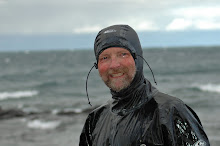
As it turns out I wouldn't have needed my skis today anyhow. I'm sitting at 9,500' (2,900m) with a mild case of altitude sickness, viewing the beautiful mountain scenery rather than playing on it. It's not fair, I didn't even have a beer last night! I will be on my game tommorow however.
As I did my daily newspaper check the Duluth News Tribune informed me that its the 20th anniversary of the discovery of zebra mussels in the Great Lakes. St Louis Bay in the Port of Duluth is lousy with them. As most of you know, they came in when ocean going ships, 'salties', dumped their ballast water that they picked up in Hamburg, Bremen or some other European port. Like most of the exotics they crowd out other more (much more) desirable native species. Lampreys are the classic ocean invader, a parasitic eel that pretty much destroyed the lake trout fishery in Lake Superior. Alewife are another species that showed up when the St Lawrence Seaway opened up. At one time they made up 90% of the biomass of Lake Michigan. When I was a kid we took the car ferry from Manitowoc, WI to Ludington, MI across Lake Michigan; my dad would avoid Chicago at all costs. From one side to the other the lake was covered with dead alewives. For some kids in eastern Wisconsin, their first paying job was shoveling dead alewives into dumpsters so people could use the beaches without becoming nauseated.
 So What is To Be Done, to quote V.I.Lenin? Lampreys have been under control for quite a while, mainly with lampricides, lamprey weirs (barriers) and traps, and by releasing sterile males into the population. Alewife have been controlled by the introduction of large predators like salmon and steelhead. Zebra mussels, our two decade 'birthday boys' , really aren't controlled. They just chip em out of things like water intakes and the like. The real question is how to deal with the root cause of over 50% of these non native invasive species - the dumping of contaminated ballast water from ocean going vessels. In the past 20 years nothing has been done, no major regulation about ballast water treatment to kill the living organisms in ballast tanks has been passed. Meanwhile at least 20 new exotics have been introduced. Port and shipping people oppose this of course, because it costs money. Right now they exchange ballast water at sea and claim that reduces the exotics by a large percentage. Those of us who have been anywhere near a boat landing in the midwest however, know that one little piece of milfoil on a prop, trailer, or even a skeg rope can infect an entire lake with this invasive weed, which is also here courtesy of ballast tanks on ocean going vessels.
So What is To Be Done, to quote V.I.Lenin? Lampreys have been under control for quite a while, mainly with lampricides, lamprey weirs (barriers) and traps, and by releasing sterile males into the population. Alewife have been controlled by the introduction of large predators like salmon and steelhead. Zebra mussels, our two decade 'birthday boys' , really aren't controlled. They just chip em out of things like water intakes and the like. The real question is how to deal with the root cause of over 50% of these non native invasive species - the dumping of contaminated ballast water from ocean going vessels. In the past 20 years nothing has been done, no major regulation about ballast water treatment to kill the living organisms in ballast tanks has been passed. Meanwhile at least 20 new exotics have been introduced. Port and shipping people oppose this of course, because it costs money. Right now they exchange ballast water at sea and claim that reduces the exotics by a large percentage. Those of us who have been anywhere near a boat landing in the midwest however, know that one little piece of milfoil on a prop, trailer, or even a skeg rope can infect an entire lake with this invasive weed, which is also here courtesy of ballast tanks on ocean going vessels.
So Great Lakes Commission, US Feds, and Canadian national government......how about getting our thumbs out of our respective posteriors and get some legislation passed? There was an excellent article published in the Milwaukee Journal three plus years ago that factors the sport fisherman into the arguments along with the shipping interests and the environmentalists. The fact is that even though dozens of exotic non native species are here, we need to immediately put a cork in the bottle to make sure that no more of them show up that could be even more destructive than the ones that are here. As Andy Buchsbaum of the National Wildfie Federation says in the Duluth News Tribune article, "Invasive species are pollution that reproduces". It would do us well to remember that at the beginning of the 2008 fishing season.
Photo Credits: Center for Great Lakes and Aquatic Sciences


3 comments:
Great posting, but I am concerned about you possibly having altitude sickness. It can kill, and it tends to recur with each assent. Check with your doctor for a med you can start several days before going to altitude. It can be life saving. Take care of yourself.
Thanks Dick. I did the diamox (aceta-something), hydrated well, and still woke up with the classic headache and mild nausea. I headed down about 1500', took it easy, and seem to be back on my form. I was hit with HAPE about a dozen years back so I am very careful. Thank again for your concern.
You must have some 'great' dead alewife stories, being a Milwaukee guy...
Good to hear your're on top of it. Be sure to start the Diamox early enough. As to alewifes: As a kid, I was surprised to discover that the beach was made of sand...under all those dead smelly fish :)
Post a Comment